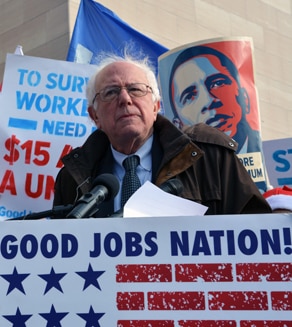-
“To preserve peace in Venezuela, there’s no choice but to convene nationwide dialogue to reform the Constitution”
From El Salvador, where the meeting of Chancellors of the Community of Latin American and Caribbean States (CELAC) is being held, the Minister of Education and leader of the Presidential Commission of the Constituent National Assembly affirmed that one of his goals is to restore the principle of cooperation of the powers, because that’s the only way to preserve peace in the country given the opposition’s lack of will to dialogue.
-
Miracles Can Happen
To follow German politics these days you have to like arithmetic. At first only up to six, for that many parties are now vying to get good grades, lots of votes, and more power in the September elections to the Bundestag, which will lead to a government ruling until 2021.
-
Anti-Boycott Bills Are Part of Wider Crackdown on Protest
A number of commentators have noted two different trends. First, across the nation Republican lawmakers are pushing for bills criminalizing protests. Second, a number of state legislatures have passed or considered, often at the impetus of Democratic lawmakers, bills aimed at silencing the movement for Palestinian human rights by targeting boycotts of Israel.
-
Time on the Clock of The World: Amin Husain on How We Handle Trump
For months now we’ve gone to dozens of marches and rallies…. This isn’t enough, but what more to do? Then I happened on a Facebook post by Amin Husain: “I wish I could share what’s wrong and what’s missing in how we’re handling the Trump era without many of my dear friends thinking that I am just being a downer on the ‘resistance’.” I had to hear more.
-
Trump’s March of Folly
The Trump White House is neofascist in terms of its political base, its ideology, and the policies it is advocating. The rest of the U.S. state, the Congress, the judiciary… are not at present neofascist. So we are in a period which is analogous to what the Nazis called Gleichschaltung (bringing into line), which means a fight within the state.
-
Politics of the Streets Meets the Politics of the Suites
Nearly three decades after his untimely death, Harold Washington’s time as mayor of Chicago offers important political lessons for current progressive activists and organizers. While he ran for office as a Democrat, Washington was, in effect, drafted by a grassroots movement that emerged from the city’s neighborhoods.… What emerged from Washington’s run was a two-way process bringing together the “politics of the suites” and the “politics of the streets.”
-
Egypt 2016: Who was worse, Mubarak, Morsi or Sisi?
2016 was a very difficult year for the Egyptians. Most—both the average man and the political caste—even say it was / is the worst year in the country’s history.
Attacking the “revolution” or uprising of 2011, its aims, symbols and representatives, has no longer become an excess of some “Mubarakists”, but obviously, the policy of the regime. This policy is encouraged by the fact that more and more Egyptians are longing to Mubarak’s time. They blame the 2011 revolution for their misery and not the policies of the regime.
-
Mythologies, Guns, Racism and the Death Penalty
This past week, I have read two judicial decisions that – once again – remind me how powerful mythologies are deployed to justify conduct that harms and mutilates human beings. However, in both cases, the majority of judges penetrate the mythology and see the case in human terms. The cases can therefore teach all of […]
-
Bears and Musical Chairs
Those who, like me, grew up with the writings of A. A. Milne may recall not just Winnie the Pooh but two other little bears and how “one of them was Bad and the other was Good” and kept getting better. In a way, that recalls German politics. The goodie in next September’s elections, it […]
-
The Muslim Ban and Judicial Power
Do federal courts have the legitimate power to block Presidential orders concerning immigration and border control? Yes. Article 3 of the constitution gives them that power. In the current controversy, we should remind ourselves of this fragile and endangered separation of powers, on which we now rely as a bulwark against racism, bigotry and xenophobia.
-
Build an Independent, Democratic Socialist Left
The following is an excerpt from Bernie Sanders’ speech at a meeting of the National Committee for Independent Political Action in New York City on June 22, 1989, published under the title “Reflections from Vermont” in the December 1989 issue of Monthly Review. [wc_highlight color=”red”] —Ed.[/wc_highlight] It seems obvious to me that there is no […]
-
For the Right of Information and Real Democracy in Zambia
Brazil’s Landless Workers Movement, Movimento dos Trabalhadores Rurais Sem Terra (MST), is a social movement founded in 1984. For more information, contact Cassia Bechara at [email protected]>.
-
Failing to Connect the Dots on Immigration: The Democratic Debate in Miami
The March 9 debate in Miami between Hillary Clinton and Bernie Sanders was the first chance the two candidates for the Democratic presidential nomination had to discuss immigration and its connections to trade and U.S. policy in Latin America. Unfortunately, neither candidate took advantage of the opportunity. The mainstream “immigration debate” generally avoids mentioning the […]
-
Scotland’s Democratic Revolution Challenges Both Austerity and the UK State
The May 7th UK general election, which saw the Conservatives win a slim majority, witnessed a democratic revolution of unprecedented scale in Scotland. England backed continued austerity, neo-liberal economics and £12 billion welfare spending cuts; the Scots overwhelmingly rejected that approach. In the UK parliament Scotland is represented by 59 MPs, of whom, before May, […]
-
Before It Is Too Late
The renaming of Troika to Institutions, Memorandum to Agreement, and Lenders to Partners, the way fish is baptized “meat,” does not change the previous situation. Neither does it change, of course, the vote of the Greek people in the 25 January 2015 elections. The people voted for what SYRIZA promised: We will overthrow the […]
-
“Today Is the Day Democracy Is Murdered”: Wave of Repression Sweeps South Korea
On December 19, the South Korean Constitutional Court delivered a devastating blow against the progressive movement when it disbanded the Unified Progressive Party (UPP) with immediate effect. That act came as the culmination of a long campaign by South Korean President Park Geun-hye to shackle the labor movement and smash political opposition. The Constitutional Court […]
-
Senator Sanders and the Impossibility of Reviving Democratic Party Liberalism
Senator Bernie Sanders of Vermont released a 12-step economic agenda on December 1, 2014. Cyber Monday at the start of the holiday commercial frenzy is not the best time to capture public attention, but Sanders probably has a strict timeline as he decides whether to run for president. The goals of Sanders’ agenda are worthy. […]
-
Democracy, Hypocrisy, and President Gauck
In the USA Republicans are jubilant. Jubilation here in Germany is about an event twenty-five years ago: “We beat those red SOBs!” But is there not, hidden behind the confetti, helium balloons, and crowing of the victors in both Germany and the USA, an occasional jarring note of anxiety? A man with good reason for […]
-
Venezuela: Questions about Democracy and a Free Press
First question: Why? If Venezuela’s government is a dictatorship, why have there been 18 elections in 15 years under the late president Hugo Chávez Frías (d. 2013) and his democratically elected successor Nicolás Maduro? Why is it that according to many international observers Venezuela’s democratic elections are, in the words of ex-president Jimmy Carter, “the […]
-
Ukraine Between “Popular Uprising for Democracy” and “Fascist Putsch”
Let’s begin with Prime Minister Stephen Harper’s version. One can think what one likes about deposed Ukrainian President Viktor Yanukovich, but his election in 2012 was recognized as legitimate by international observers and, after a certain hesitation, by the defeated candidate, Yulia Timoshenko. In fact, relatively honest elections were just about the only positive […]











